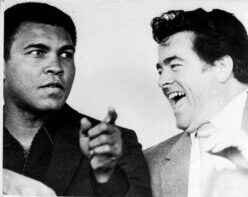A football club is a business; its financial health has to be secured before big plans can be put into practice. Sometimes that means changing the mix, bringing new elements into a happy team. And in business – especially one as high profile as football – politics and ego are never far away.
In the 1970s and 1980s. long before professional status and Hollywood saviours, financing an ambitious non-league football club was tough. In 1986 the club was in financial difficulty. I’d put in a lot of cash and time myself, but needed help.
A Coventry businessman named Joe Shooter had stalked my pipework company’s Chief Engineer – at the swimming baths to gain an introduction to me. He claimed to be involved at Mansfield Town, FC, and would give up his commitments there to help me at the Boro.
I phoned the Mansfield chairman, who told me, “I think he’s got a bit of money and he’s very interested in football. If you can handle him, he could be good for your club.”
I should have asked what he meant by “handle him”. I later learned that Shooter’s only connection with Mansfield was raising money to take youth team boys on “tours and holidays”. This should have concerned me, but times were different then. Shooter had been ordered out of the Mansfield boardroom for pestering board members and inviting himself into situations where his presence wasn’t appropriate.
But I didn’t know this at the time. And Shooter was prepared to buy £10,000 worth of shares – the club needed the money badly.
On 14 October 1986, Shooter was officially co-opted onto the board as vice-chairman. The very next day, on Coventry’s local radio station, Mercia Sound, he said, “Oh yes. That’s the whole idea, isn’t it? For me to become chairman.”
The following week, Shooter brought his bank manager to discuss improving the cash situation at the club. I told them how much time and money I had put into the club over ten years. I told them how passionate I was, that I had made Nuneaton my home, that I had big dreams for Nuneaton Borough and I believed that, with the right help, I could make them come true.
Shooter didn’t pause for a second. “If you want, I’m prepared to take over and pay you back the money you’ve put into the club over, say, the next three years.”
At that time, my shares were worth £53,000 and my loans to the club were over £100,000. But the bank manager said he’d “done his homework” and advised Shooter to pay me £70,000 for the club.
I made it very clear that I had no intention of relinquishing the Chair, and that this was not why I had invited Shooter on board.
“Well, we’ll see about that, I’m sure.” was his response.
Within a fortnight, three directors told me that Shooter was trying to buy more shares in the club.
Norman Peckett, managing director and editor of the Nuneaton Tribune, called me and said “Noel, I want to give you some advice. Take the £70,000 and find yourself another club.” How did he know the detail of a private confidential meeting?
At that point, I had not ever thought about handing over control of the club. But if Shooter had worked with me as Vice Chairman and shown that he was willing – and able – to develop the club, then the idea of him eventually becoming Chairman might have been acceptable, even welcome.
But to waltz in, announce his intention and then set about taking over the club, and in doing so upsetting the status quo and the people who’d put the club where it was, well, this just wasn’t acceptable to me. I decided I had to act to stop him.
Just two months after bringing in someone I had hoped would have a positive impact on the club, I was forced to take action. I was advised by my solicitor, Michael Holbrook, partner at Coventry firm Varley Hibbs, to call an Extraordinary General Meeting to propose removing Shooter from the board.
The First Meeting
The EGM in January 1987 should have been a straightforward affair. Alf Scattergood, as President, was in the chair. My solicitor Alan Lodge, Holbrook’s junior, sat beside me. As they had instructed, I explained that Shooter was undermining me as Chairman and damaging the club. I proposed he be removed from the board.
I asked my solicitor to insist on a poll vote – which would have seen my proposal passed. This was within my rights and within company procedure, but it was ignored.
But I was to discover that Shooter had already got himself an ally, a man named Harry Broadhurst. Broadhurst shouted down the suggestion and launched a loud verbal attack on me. Others joined in, and the meeting became an unseemly shouting match. Scattergood failed to control proceedings and my solicitor just shrugged at me. There was no alternative than to call an adjournment. I proposed a second EGM be held three weeks later with the same motion – to remove Shooter from the board.
